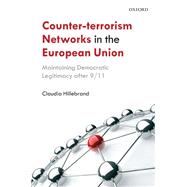Counter-Terrorism Networks in the European Union Maintaining Democratic Legitimacy after 9/11
, by Hillebrand, Claudia- ISBN: 9780199655052 | 0199655057
- Cover: Hardcover
- Copyright: 12/2/2012
Counter-Terrorism Networks in the European Union: Maintaining Democratic Legitimacy after 9/11presents a model of democratic legitimacy for within international counter-terrorism co-operation. Exploring the current practices of European Union (EU) counter-terrorism policing, developed after 9/11, it highlights the current significant challenges to democratic legitimacy and seeks to present tools and solutions which ensure 'democratic' counter-terrorism actions and the protection of human rights. Counter-terrorism policing is now a global concern, with co-operation between security authorities of different countries a crucial feature in the fight to prevent terrorism and extremism. Yet, given the emphasis on pre-emption, this type of policing tends to interfere to a far greater extent with the rights of the individual than traditional policing. This book scrutinises the current focus of enhanced communication between counter-terrorist associates at member-state and EU levels within Europe, alongside analysis of just how far the traditional, protective mechanisms of accountability and oversight are managing to keep up with this development. It proposes that current forms of counter-terrorism policing within the EU should be understood as networks - sets of expert institutional nodes or individual agents, from at least two countries - that are interconnected in order to authorize and provide security with regard to counter-terrorism, using the European Police Office (Europol) as a key example.







